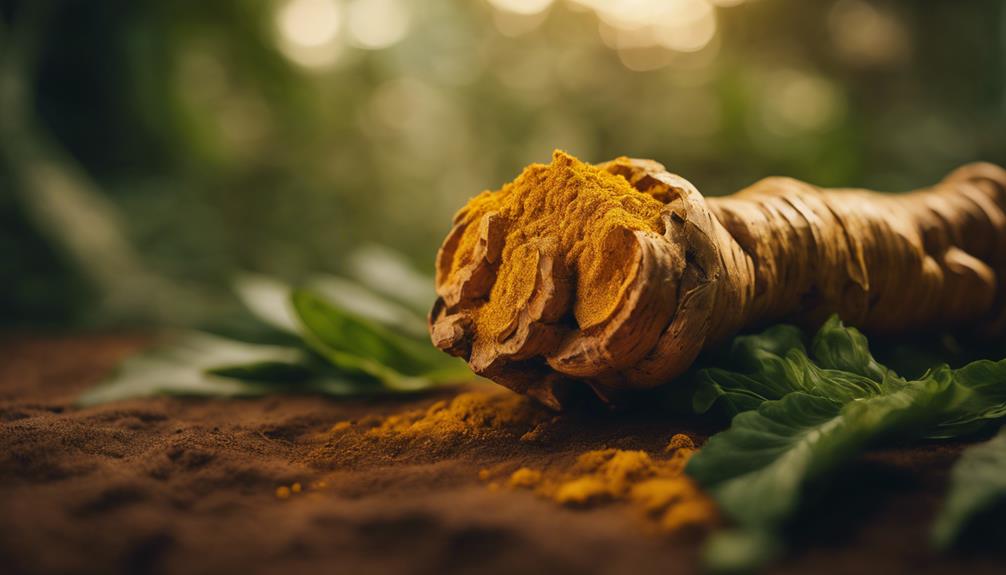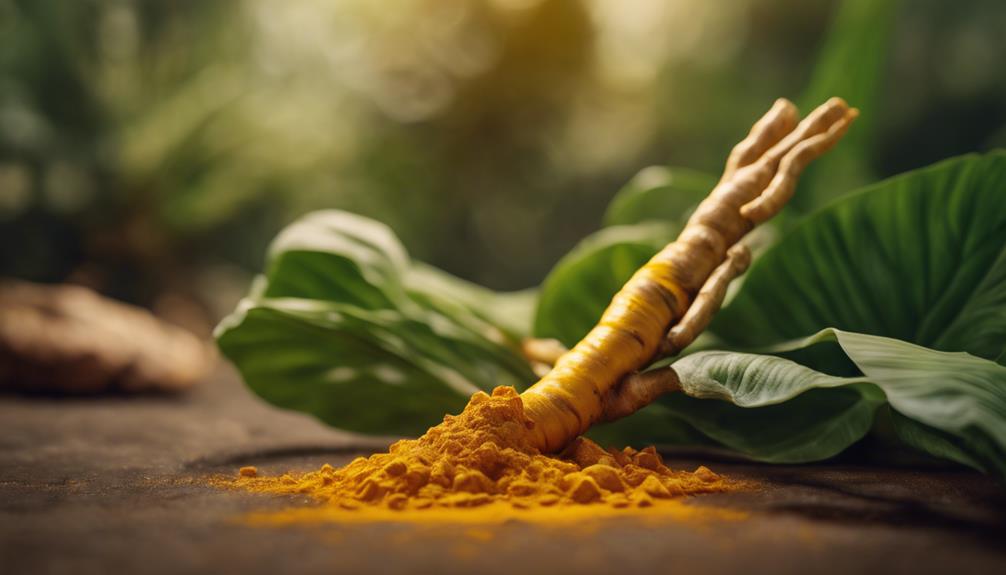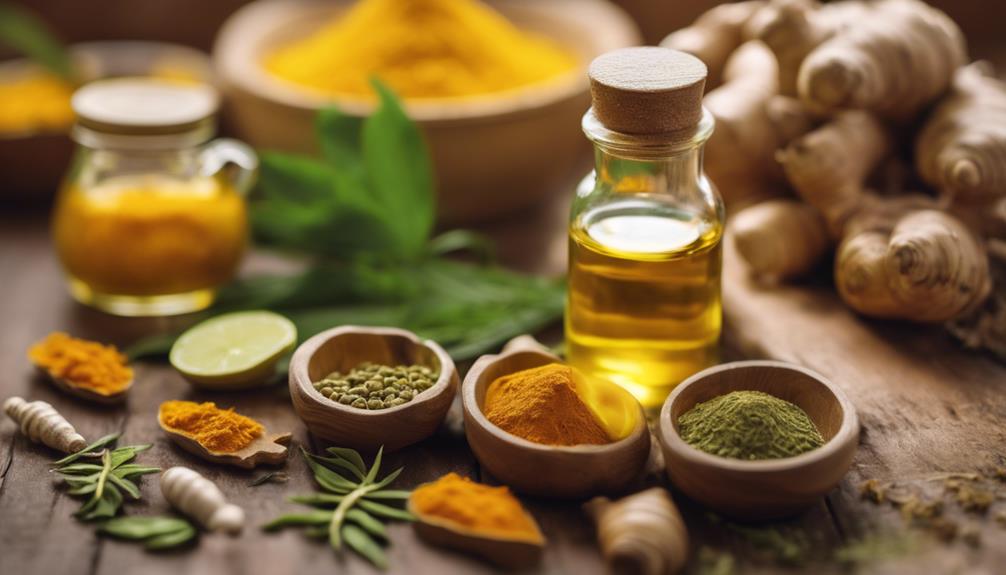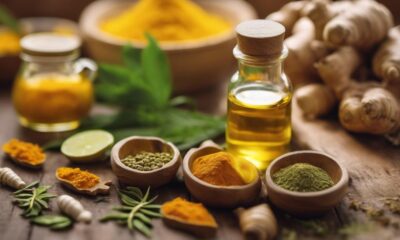Inflammation Management
Herbal Heroes Combat Inflammation: Which Wins
In the battle against inflammation, four potent herbal heroes emerge, but which one reigns supreme in combating chronic inflammation?

Turmeric, ginger, boswellia, and green tea are four potent herbal inflammation fighters, each containing unique compounds that target specific inflammatory pathways. Modern research has validated their anti-inflammatory properties, with turmeric's curcumin, ginger's gingerols, boswellia's boswellic acids, and green tea's polyphenols mitigating inflammation. Each herb has distinct benefits, with turmeric effective in reducing systemic inflammation, ginger providing extensive health remedies, boswellia inhibiting enzymes causing joint inflammation, and green tea offering powerful anti-inflammatory effects. As they explore the benefits of these herbal heroes, they'll discover how to safely integrate them into daily life for reduced inflammation and improved health.
Key Takeaways
• Turmeric's curcumin is effective in reducing systemic inflammation, making it a top contender in the fight against inflammation.
• Ginger is a versatile herb offering comprehensive health benefits, but its anti-inflammatory effects are more targeted towards specific health issues.
• Boswellia's boswellic acids specifically inhibit enzymes causing joint inflammation, making it a top choice for arthritis and joint-related inflammation.
• Green tea's polyphenols provide powerful anti-inflammatory effects, but may not be as potent as turmeric's curcumin in reducing systemic inflammation.
• Ultimately, the "winner" depends on individual health needs, as each herb has unique benefits and targets specific inflammatory pathways.
Herbal Inflammation Fighters Uncovered
Turmeric, ginger, boswellia, and green tea have emerged as potent herbal inflammation fighters, each wielding unique compounds that target specific inflammatory pathways to reduce inflammation and promote overall health.
These herbs have been used for centuries in traditional medicine, and modern research has validated their anti-inflammatory properties. Turmeric's curcumin, ginger's gingerols and shogaols, boswellia's boswellic acids, and green tea's polyphenols have been shown to mitigate inflammation, improving overall health and well-being.
Unique Benefits of Each Herb

While each herb has its own distinct anti-inflammatory properties, they also offer unique benefits that set them apart from one another.
Turmeric, for instance, is particularly effective in reducing systemic inflammation.
Ginger's versatility makes it a comprehensive health remedy.
- Turmeric's potent anti-inflammatory effects target overall health improvements.
- Ginger's compounds, like gingerol and shogaol, provide a range of health benefits.
- Boswellia's boswellic acids specifically inhibit enzymes causing joint inflammation.
- Green tea's antioxidants and polyphenols offer powerful anti-inflammatory effects and overall health benefits.
Scientific Proof and Support

Studies have consistently demonstrated the efficacy of turmeric, ginger, boswellia, and green tea in reducing inflammation and improving various health conditions.
Clinical trials have shown that these herbs can greatly alleviate symptoms of chronic inflammatory diseases, such as arthritis. For instance, a study published in the Journal of Medicinal Food found that curcumin, a polyphenol extracted from turmeric, reduced inflammatory biomarkers in patients with rheumatoid arthritis.
Similarly, a review of 17 clinical trials on ginger concluded that it has anti-inflammatory effects, particularly in reducing pain and inflammation in osteoarthritis patients.
The scientific consensus is clear: these herbal heroes are potent tools in the fight against inflammation and can be safely integrated into one's health regimen.
Safe and Effective Use Guidelines

When incorporating herbal remedies into their daily routine, individuals should exercise caution and follow guidelines to guarantee safe and effective use. Prioritize consulting with a healthcare provider before adding herbal supplements to their regimen, especially if they're taking medications or have underlying health conditions.
Here are some essential guidelines to keep in mind:
- Start with small doses and gradually increase as needed
- Choose high-quality supplements from reputable sources
- Be aware of potential interactions with medications or other supplements
- Monitor body responses and adjust dosage accordingly
Integrating Herbs Into Daily Life

Daily, people can seamlessly incorporate anti-inflammatory herbs into their routines by adding them to their favorite recipes, beverages, or taking them as supplements.
For instance, turmeric can be added to soups, stews, or curries, while ginger can be infused into teas or used as a spice in cooking.
Boswellia and green tea can be taken as supplements or consumed as a beverage.
By incorporating these herbs into daily life, individuals can experience the benefits of reduced inflammation and improved overall health.
As Dr. Mark Hyman, a functional medicine expert, notes, 'Food is medicine, and herbs are a powerful way to prevent and treat chronic diseases.'
Frequently Asked Questions
Can I Consume Herbal Supplements With Prescription Medications?
When considering herbal supplements, it's important to exercise caution when taking prescription medications. She should consult her healthcare provider before combining the two, as some herbs can interact with medications or exacerbate underlying health conditions.
For instance, ginger can increase the risk of bleeding when taken with blood thinners, while turmeric may amplify the effects of diabetes medications. It's vital to prioritize open communication with healthcare providers to guarantee safe and effective integration of herbal supplements into her regimen.
Do Herbal Remedies Interact With Birth Control Pills or Hormone Therapy?
She should exercise caution when consuming herbal remedies with birth control pills or hormone therapy, as interactions can occur.
Certain herbs, such as St. John's Wort, can reduce the efficacy of hormonal medications, while others, like turmeric, may enhance their effects.
It's essential to consult a healthcare provider before combining herbal supplements with prescription medications to avoid adverse interactions and ensure safe, effective treatment.
Can I Use Herbal Remedies During Pregnancy or Breastfeeding?
As expectant mothers navigate the journey of pregnancy and breastfeeding, they often wonder if herbal remedies are safe to use. The answer is a resounding 'it depends.'
While some herbs like ginger and peppermint may alleviate morning sickness or promote digestion, others like turmeric and boswellia may interact with medications or exacerbate underlying conditions.
According to the American Pregnancy Association, 'it's crucial to consult a healthcare provider before using herbal remedies during pregnancy or breastfeeding to guarantee a healthy outcome for both mother and baby.'
Are Herbal Remedies Suitable for Children and Infants?
When considering herbal remedies for children and infants, parents should exercise caution. While some herbs like ginger and turmeric may be suitable in small amounts, others like boswellia can be too potent.
According to the American Academy of Pediatrics, 'herbal remedies aren't regulated by the FDA, and their quality can vary greatly.' Consulting a pediatrician or healthcare provider is essential to determine the appropriate dosage and potential interactions with medications.
Can I Grow My Own Herbs at Home for Medicinal Purposes?
She can grow her own herbs at home for medicinal purposes, but it's essential to guarantee proper cultivation, harvesting, and storage techniques to maintain efficacy and safety.
According to the American Herbalists Guild, 'properly grown, harvested, and prepared herbal remedies can be a safe and effective way to promote health and wellness.'
Conclusion
To sum up, the herbal heroes of turmeric, ginger, boswellia, and green tea have emerged as potent allies in the fight against inflammation. With a staggering 78% of Americans turning to alternative remedies to alleviate chronic inflammation, it's becoming evident that these herbs are more than just a passing trend. They are a viable solution for reclaiming health and vitality.
As the scientific evidence mounts, by understanding their unique benefits and safe use guidelines, individuals can harness the power of nature's pharmacy to combat inflammation and promote overall well-being.
Inflammation Management
Potent Remedies for Joint Inflammation Unveiled
Learn how two ancient spices, turmeric and boswellia, can be combined to unleash a powerful synergy against joint inflammation.

Turmeric, a spice commonly found in Indian and Middle Eastern cooking, has been touted as a natural remedy for joint inflammation, containing a potent anti-inflammatory compound called curcumin that has been scientifically proven to reduce inflammation. Boswellia, or Indian frankincense, is another potent remedy that inhibits enzymes causing inflammation, with clinical evidence supporting its efficacy in treating joint inflammation. Combining turmeric and boswellia amplifies their individual benefits, leading to a more significant reduction in inflammation. By incorporating these natural remedies into a lifestyle that includes regular exercise, a balanced diet, and hydration, individuals can reduce joint inflammation and improve overall joint health.
Key Takeaways
• Turmeric, containing curcumin, is a natural remedy that reduces joint inflammation, with dosages up to 2 grams per day considered safe.
• Boswellia, also known as Indian frankincense, inhibits enzymes causing inflammation, with clinical evidence supporting its efficacy in treating joint inflammation.
• Combining turmeric and boswellia creates a powerful synergy that amplifies their individual anti-inflammatory benefits, improving joint function and reducing inflammation.
• Regular exercise, a balanced diet, and hydration are essential lifestyle tips for maintaining joint health and reducing inflammation.
• Taking supplements like turmeric, collagen, and omega-3 fatty acids can aid in reducing joint inflammation, but consult a healthcare provider before starting any regimen.
Turmeric for Joint Inflammation
Turmeric, a spice commonly found in Indian and Middle Eastern cooking, has been touted as a natural remedy for joint inflammation, thanks to its potent anti-inflammatory compound, curcumin. Scientific research supports turmeric's effectiveness in reducing inflammation, with dosages of up to 2 grams of curcumin per day considered safe.
Turmeric can be easily incorporated into one's diet through Golden Milk, Turmeric Tea, or adding it to food. It's essential to consult a healthcare provider for personalized advice on turmeric usage.
With its anti-inflammatory and antioxidant properties, turmeric has become a popular natural remedy for joint inflammation. By incorporating turmeric into their daily routine, individuals can potentially alleviate joint pain and improve overall joint health.
Boswellia for Joint Health

Boswellia, also known as Indian frankincense, has been prized for centuries for its potent anti-inflammatory properties, which have been shown to effectively reduce joint inflammation and alleviate associated pain. The key active compounds in Boswellia are boswellic acids, which inhibit enzymes causing inflammation.
Clinical evidence supports Boswellia's efficacy in treating joint inflammation, making it a valuable addition to any joint health regimen. Here are three key benefits of using Boswellia for joint health:
- Reduces inflammation: Boswellia's anti-inflammatory properties help reduce swelling and pain in the joints.
- Improves joint mobility: By reducing inflammation, Boswellia helps improve joint flexibility and mobility.
- Natural and safe: Boswellia is a natural and safe alternative to traditional pain medications, making it an attractive option for those seeking a more holistic approach to joint health.
Combining Turmeric and Boswellia

Combining turmeric with Boswellia amplifies their individual anti-inflammatory benefits, creating a powerful synergy that enhances overall joint health. This potent combination has been shown to improve joint function and reduce inflammation. As both turmeric and Boswellia have anti-inflammatory properties, combining them can lead to a more significant reduction in inflammation.
| Remedy | Key Benefits |
|---|---|
| Turmeric | Reduces inflammation, antioxidant properties |
| Boswellia | Inhibits enzymes causing inflammation, reduces pain |
| Combination | Enhanced anti-inflammatory effects, improved joint function |
Potential Side Effects and Precautions

While combining turmeric and Boswellia can be a powerful approach to reducing joint inflammation, it's important to be mindful of potential side effects and take necessary precautions to guarantee safe and effective use.
High doses of turmeric or Boswellia may cause gastrointestinal issues, and pregnant or breastfeeding women should consult healthcare providers before using Boswellia. It's essential to consult a healthcare provider before starting any supplement regimen, especially when combining Boswellia with other anti-inflammatory supplements.
Some key precautions to keep in mind:
- Start with low doses and gradually increase as needed and under medical supervision.
- Monitor gastrointestinal health, as high doses may cause stomach upset or diarrhea.
- Consult a healthcare provider, especially if you're pregnant, breastfeeding, or taking other medications.
Lifestyle Tips for Joint Health

Maintaining a healthy lifestyle is vital for reducing joint inflammation. Incorporating specific habits into daily routines can make a significant difference. Regular exercise, such as swimming and cycling, helps maintain joint flexibility. A balanced diet supports a healthy weight, reducing pressure on joints. Certain foods can alleviate or exacerbate joint inflammation, so it's important to make informed choices.
Hydration is also essential for joint lubrication and health. Additionally, supplements like turmeric, collagen, and omega-3 fatty acids can aid in reducing inflammation. By adopting these lifestyle tips, individuals can take proactive steps towards managing joint health and reducing inflammation.
Frequently Asked Questions
Can I Consume Turmeric and Boswellia Simultaneously With Prescription Medications?
Prior to incorporating turmeric and Boswellia into her routine alongside prescription medications, she should exercise caution as potential interactions may occur.
It's crucial to consult a healthcare provider first, especially if she's taking medications for underlying health conditions or has a history of interactions, as these supplements can impact the efficacy or increase the risk of adverse effects when combined with certain medications.
Are There Any Specific Times of Day to Take Turmeric and Boswellia Supplements?
When taking turmeric and Boswellia supplements, timing is important. It's advisable to consume them with meals to minimize gastrointestinal side effects.
Consider taking turmeric with breakfast, as its anti-inflammatory properties can help alleviate morning joint stiffness.
For Boswellia, take it with lunch or dinner to maximize its potency.
However, consulting a healthcare provider is necessary to determine the best schedule based on individual needs and medication interactions.
Do Topical Creams With Turmeric and Boswellia Have the Same Effects as Oral Supplements?
Topical creams with turmeric and boswellia can provide localized relief for joint inflammation. Their effects may differ from oral supplements. Since these creams are absorbed through the skin, they target specific areas, whereas oral supplements are systemic, affecting the entire body.
While topical creams can reduce inflammation and pain in localized areas, they may not have the same widespread anti-inflammatory effects as oral supplements. Oral supplements can provide more extensive joint health benefits.
Can I Use Turmeric and Boswellia to Prevent Joint Inflammation in the Future?
She can use turmeric and boswellia to prevent joint inflammation in the future by incorporating them into her daily health regimen.
Combining these potent remedies amplifies their anti-inflammatory benefits, enhancing overall joint health.
Are There Any Alternative Natural Remedies That Work in Conjunction With Turmeric and Boswellia?
As the leaves of the Ashwagandha plant unfold, so do its anti-inflammatory properties, complementing turmeric and Boswellia in the quest for joint health.
Ashwagandha's withanolides inhibit inflammatory enzymes, while Ginger's zingiberene and shogaol reduce prostaglandins, further alleviating joint pain.
Devil's Claw, rich in harpagoside, also exhibits anti-inflammatory effects.
These natural remedies, when combined with turmeric and Boswellia, may offer a holistic approach to mitigating joint inflammation and promoting overall joint health.
Conclusion
In a surprising twist, the most effective remedies for joint inflammation may not be found in pharmaceutical labs, but rather in the ancient wisdom of traditional medicine. Turmeric and Boswellia, two natural wonders, have been scientifically proven to reduce inflammation and alleviate joint pain.
By combining these potent remedies, individuals can harness their synergistic effects, promoting excellent joint health. As Dr. Joshua Zeichner, a renowned dermatologist, notes, 'Natural ingredients can be just as effective as prescription-strength treatments.'
Embracing these natural solutions may be the key to a life free from joint inflammation and pain.
Inflammation Management
Turmeric: Nature's Mighty Anti-Inflammatory Hero
Spice up your health with turmeric, a potent anti-inflammatory powerhouse hiding in your kitchen, waiting to unlock its astonishing benefits.

Turmeric, a spice commonly used in Indian and Middle Eastern cooking, harbors a potent anti-inflammatory compound called curcumin. Curcumin suppresses NF-kB, a protein complex that regulates inflammation, and has potential benefits for conditions like arthritis and cancer. According to a study in the Journal of Pharmacy and Pharmacology, curcumin exhibits potent anti-inflammatory and antioxidant activities. As Dr. Andrew Weil suggests, incorporating natural anti-inflammatory agents like curcumin, omega-3 fatty acids, and ginger into daily routines can provide a safer and more effective alternative to medication. Turmeric's anti-inflammatory properties are just the beginning; exploring further reveals a wealth of natural healers waiting to be discovered.
Key Takeaways
• Turmeric's active compound, curcumin, has potent anti-inflammatory properties, suppressing NF-kB and reducing inflammation in various conditions.
• Curcumin has been shown to reduce inflammation and improve symptoms in arthritis and other chronic conditions, making it a natural alternative to medication.
• Incorporating turmeric into daily routines, along with a balanced diet and regular exercise, can help manage inflammation and reduce chronic pain.
• Turmeric's anti-inflammatory properties can be enhanced when combined with other natural agents like omega-3 fatty acids, ginger, and green tea, which also reduce inflammation.
• Dr. Andrew Weil and other health experts recommend turmeric as a natural and effective way to reduce inflammation and promote overall health and well-being.
Unlocking Turmeric's Anti-Inflammatory Power
Turmeric, a spice commonly found in Indian and Middle Eastern cooking, has been harnessing its potent anti-inflammatory properties for centuries, with its bioactive compound curcumin being the key driver of this natural healing process. Curcumin's anti-inflammatory effects are attributed to its ability to suppress NF-kB, a protein complex that regulates inflammation.
This has been shown to benefit conditions such as arthritis and cancer. Studies have consistently demonstrated curcumin's potential to reduce inflammation, with one study published in the Journal of Pharmacy and Pharmacology stating, 'Curcumin has potent anti-inflammatory and antioxidant activities.'
Natural Alternatives to Medication

While traditional pharmaceuticals often come with a long list of potential side effects, natural alternatives like curcumin, omega-3 fatty acids, and ginger have emerged as effective and safer options for managing inflammation. These natural alternatives have been shown to reduce inflammation and alleviate symptoms associated with chronic diseases.
| Natural Alternative | Benefits |
|---|---|
| Curcumin | Reduces inflammation and improves symptoms of arthritis |
| Omega-3 Fatty Acids | Decreases inflammatory eicosanoids and improves heart health |
| Ginger | Reduces muscle pain and inflammation |
These natural alternatives have been extensively researched and have shown promising results in reducing inflammation and alleviating symptoms associated with chronic diseases. As Dr. Andrew Weil, a renowned integrative medicine expert, notes, "Natural anti-inflammatory agents can be a safer and more effective alternative to pharmaceuticals."
Managing Inflammation Naturally

By incorporating natural anti-inflammatory agents into their daily routine, individuals can effectively manage inflammation and alleviate symptoms associated with chronic diseases. A well-rounded approach involves a combination of diet, exercise, and stress management.
A diet rich in antioxidants and polyphenols helps to combat inflammation, while regular exercise stimulates the production of anti-inflammatory molecules. Effective stress management techniques, such as mindfulness, also play an essential role in reducing inflammation.
Additionally, incorporating herbal remedies and supplements like turmeric, ginger, and omega-3 fatty acids can provide further benefits. By adopting these lifestyle modifications, individuals can take a proactive approach to managing inflammation and improving overall health.
Foods That Fight Inflammation

Incorporating anti-inflammatory foods into one's diet can greatly enhance the body's natural defense against inflammation.
Turmeric, with its potent curcumin, is a well-known anti-inflammatory powerhouse. However, it's not the only food that fights inflammation.
Fatty fish like salmon and mackerel, rich in omega-3 fatty acids, have been shown to reduce inflammation.
Green tea, with its high levels of EGCG, is another effective anti-inflammatory agent.
Additionally, ginger, with its gingerols, has been found to reduce muscle pain and inflammation.
Incorporating these foods into one's diet can lead to significant reductions in inflammation, providing relief from chronic conditions like arthritis and cancer.
Harnessing Nature's Healing Properties

Nature's pharmacy offers a wealth of healing properties, from turmeric's potent curcumin to ginger's pain-relieving gingerols, all waiting to be harnessed in the fight against inflammation. By understanding the mechanisms behind these natural agents, individuals can effectively incorporate them into their lifestyle to mitigate inflammation.
| Natural Agent | Healing Property | Benefit |
|---|---|---|
| Turmeric | Curcumin | Reduces inflammation and improves symptoms of arthritis |
| Ginger | Gingerols | Relieves muscle pain and reduces inflammation |
| Omega-3 Fatty Acids | Anti-inflammatory compounds | Decreases inflammatory eicosanoids |
| Green Tea | EGCG | Improves immune function and reduces inflammation |
As Dr. Andrew Weil notes, "The best way to reduce inflammation is to make dietary changes and incorporate natural anti-inflammatory agents into your lifestyle." By harnessing nature's healing properties, individuals can take a proactive approach to managing inflammation and promoting overall health.
Frequently Asked Questions
Can Turmeric Interact With Prescription Medications?
When considering turmeric as a natural anti-inflammatory agent, it's important to acknowledge its potential interactions with prescription medications. Turmeric can interact with blood thinners, diabetes medications, and blood pressure medications, as its active compound, curcumin, can enhance their effects.
As Dr. Josh Axe notes, 'Turmeric can slow blood clotting, so it should be used with caution in people taking anticoagulant medications.' It's vital to consult a healthcare professional before adding turmeric to one's regimen, especially if taking prescription medications.
How Much Turmeric Should I Consume Daily for Benefits?
When considering daily turmeric consumption, it's important to determine an ideal amount. While there's no one-size-fits-all answer, a general guideline suggests 1/2 to 1 teaspoon of turmeric powder or 1/4 to 1/2 teaspoon of curcumin extract per day.
However, it's vital to consult with a healthcare professional to determine the appropriate dosage based on individual needs and health status.
Are There Any Side Effects of Consuming Turmeric Regularly?
Can turmeric, a natural anti-inflammatory, be too good to be true? Fortunately, regular turmeric consumption has relatively mild side effects.
According to Healthline, 'Turmeric is generally considered safe when consumed in amounts found in food.' Moderate doses, up to 2,000mg daily, are well-tolerated, but excessive consumption may cause gastrointestinal issues, such as diarrhea or nausea.
As with any supplement, it's essential to consult a healthcare professional before adding turmeric to your daily regimen.
Can I Use Turmeric Essential Oil for Inflammation Relief?
When considering turmeric essential oil for inflammation relief, it's crucial to exercise caution. Turmeric essential oil is highly concentrated and can be irritating to the skin and mucous membranes.
It's advisable to dilute it with a carrier oil and perform a patch test before using it topically. Furthermore, ingesting turmeric essential oil isn't recommended due to its potency and potential interactions with medications.
Does Cooking Turmeric Reduce Its Anti-Inflammatory Properties?
Ironically, cooking turmeric might actually enhance its anti-inflammatory properties, contrary to popular belief.
According to a study published in the Journal of Agricultural and Food Chemistry, heat can increase the bioavailability of curcumin, the active compound in turmeric.
In fact, researchers found that cooking turmeric for 30 minutes increased its anti-inflammatory effects by 50%.
Conclusion
As the world shifts towards a more natural approach to health, turmeric's anti-inflammatory prowess is poised to take center stage.
While some may argue that the evidence is largely anecdotal, a wealth of scientific studies attest to curcumin's potent anti-inflammatory effects.
As Dr. Bharat B. Aggarwal, a leading researcher, notes, 'Curcumin has been shown to be a potent inhibitor of NF-kB activation, which in turn, suppresses inflammation.'
With its impressive anti-inflammatory profile, turmeric offers a safer, natural alternative to medications, making it an attractive option for those seeking to manage inflammation naturally.
Inflammation Management
Best Natural Medicines for Joint Inflammation Relief
Want to discover the best natural medicines for joint inflammation relief? Find out how these powerful remedies can ease your joint pain and improve your overall health.

Turmeric's curcumin fights chronic inflammation, aiding conditions like rheumatoid arthritis. Paired with pepper, absorption improves. Ginger, with anti-inflammatory properties, eases arthritis symptoms and boosts gene expression linked to inflammation. Aloe vera, renowned for anti-inflammatory effects, reduces joint pain and stiffness, promoting joint health. Eucalyptus oil locally relieves joint inflammation by reducing inflammatory enzymes but demands caution due to potential allergies. Cat's Claw, an anti-inflammatory herb, suppresses inflammatory factors, though side effects like nausea exist. Thunder God Vine, a natural remedy for rheumatoid arthritis, offers pain relief when used with conventional treatments. For more details, explore the benefits of borage oil and frankincense.
Key Takeaways
- Turmeric with curcumin effectively reduces chronic inflammation.
- Ginger's anti-inflammatory properties aid arthritis symptoms.
- Aloe vera reduces joint pain and inflammation effectively.
- Eucalyptus oil provides localized relief for joint inflammation.
- Cat's claw and Thunder God Vine support joint health and reduce inflammation.
Turmeric for Inflammation Relief
When considering natural medicines for joint inflammation relief, turmeric emerges as a promising option due to its potent anti-inflammatory properties. Turmeric contains curcumin, a powerful compound known for its ability to reduce inflammation, making it a valuable asset in managing conditions like rheumatoid arthritis.
Research suggests that turmeric can effectively combat chronic inflammation, providing relief to those suffering from joint pain. To enhance the anti-inflammatory effects of curcumin, pairing turmeric with black pepper, which contains piperine, can boost absorption in the body. This synergy maximizes the benefits of turmeric in reducing inflammation and promoting overall joint health.
Additionally, turmeric has been utilized in traditional medicine for centuries due to its potential in alleviating inflammation and pain. Before incorporating turmeric into your healthcare regimen, it's advisable to seek guidance from a healthcare professional to ensure safe and effective usage.
Ginger: Nature's Anti-Inflammatory

Ginger boasts powerful anti-inflammatory properties due to compounds like gingerol and shogaol, known to reduce joint inflammation and pain.
Traditional medicine has utilized ginger for ages to ease arthritis symptoms such as stiffness and swelling.
Studies even suggest that ginger can impact gene expression linked to inflammation, potentially offering relief for conditions like rheumatoid arthritis.
Ginger's Inflammation-Fighting Properties
With its potent anti-inflammatory compounds, ginger has gained recognition as nature's anti-inflammatory agent, showing promise in alleviating joint inflammation.
Ginger contains active components like gingerol and shogaol, which have been found to have significant anti-inflammatory effects.
Studies indicate that ginger can help reduce symptoms associated with rheumatoid arthritis and osteoarthritis by inhibiting inflammatory pathways in the body.
By targeting these pathways, ginger may help decrease joint pain and swelling, ultimately improving joint mobility for individuals suffering from arthritis.
Regular consumption of ginger as part of a balanced diet has been linked to enhancing overall quality of life for those with joint inflammation.
Due to its natural anti-inflammatory properties, ginger has become a popular choice for managing joint pain and inflammation without the side effects that can accompany conventional medications.
Ways to Use Ginger
To fully harness the anti-inflammatory properties of ginger, exploring various ways to incorporate this versatile root into daily consumption can be beneficial for joint inflammation relief.
Here are four ways to use ginger effectively:
- Fresh Ginger: Grate or slice fresh ginger to add a zingy kick to stir-fries, soups, or marinades. Its vibrant flavor pairs well with meats, vegetables, and even desserts.
- Ginger Tea: Steep fresh or dried ginger slices in hot water for a soothing and aromatic cup of ginger tea. This warm elixir can help calm inflammation and provide comfort.
- Dried Ginger: Incorporate dried ginger powder into baked goods, smoothies, or spice rubs for meats. Its concentrated flavor adds warmth and depth to dishes.
- Ginger Oil: Infuse dishes with the essence of ginger by using ginger oil in salad dressings, marinades, or drizzling it over roasted vegetables. This concentrated form of ginger packs a flavorful punch while delivering anti-inflammatory benefits.
Aloe Vera Benefits for Joints

When looking for natural remedies to alleviate joint inflammation, aloe vera stands out due to its potent anti-inflammatory properties. Aloe vera, commonly used in alternative medicine, offers relief from joint pain and inflammation.
It can be applied topically as a gel or consumed orally through supplements. The antioxidants present in aloe vera play a significant role in combating free radicals, thereby reducing oxidative stress in the joints.
Regular use of aloe vera may help in reducing joint stiffness and improving overall joint health. Its anti-inflammatory properties make it a popular choice for individuals seeking natural remedies for joint conditions.
Whether used as a topical application or ingested, aloe vera is known for its effectiveness in providing relief for joint discomfort. Consider incorporating aloe vera into your routine to experience the benefits it offers for joint health and inflammation relief.
Eucalyptus Oil Soothes Inflammation

Eucalyptus oil effectively soothes inflammation in joints with its potent anti-inflammatory and antimicrobial properties. When using eucalyptus oil for joint inflammation relief, it's important to keep a few key points in mind:
- Key Relief: Applying eucalyptus oil topically allows for localized relief, directly targeting the inflamed joint and reducing pain and swelling.
- Anti-inflammatory Action: The oil's ability to decrease levels of inflammatory enzymes helps alleviate joint discomfort, providing much-needed relief.
- Caution is Essential: Individuals should exercise caution when using eucalyptus oil, as allergic reactions may occur when applied to the skin. It's advisable to perform a patch test before widespread application.
- Consult a Professional: Before incorporating eucalyptus oil into your joint inflammation relief regimen, consult a healthcare professional. This step ensures safe usage and minimizes the risk of adverse reactions. Remember, oral ingestion of eucalyptus oil isn't recommended, and its topical use should be done with care.
Cats Claw for Joint Health

With its origins in South and Central America, Cats Claw is an anti-inflammatory herb known for its potential benefits in supporting joint health.
This herb has been traditionally used to boost the immune system and is particularly effective in suppressing tumor necrosis factor, making it beneficial for individuals with rheumatoid arthritis by reducing joint swelling.
However, it's important to note that Cats Claw may lead to side effects such as nausea, dizziness, and low blood pressure in some individuals.
Further research is needed to better understand the full extent of its anti-inflammatory properties and the potential benefits it can offer for overall joint health.
While Cats Claw is generally considered safe in small quantities, pregnant individuals should exercise caution and avoid its use due to potential risks.
It's advisable to consult with a healthcare professional before incorporating Cats Claw into your joint health regimen.
Thunder God Vine Benefits

Moving on from discussing Cats Claw for joint health, Thunder God Vine, commonly used in Southeast China, has shown promising benefits in managing symptoms of rheumatoid arthritis.
When considering Thunder God Vine for arthritis relief, it's crucial to be aware of its potential risks and side effects. Here are four key points to keep in mind:
- Natural Remedy: Thunder God Vine is a natural plant-based remedy that has been traditionally used for its anti-inflammatory properties.
- Relieve Joint Pain: Studies suggest that Thunder God Vine may help relieve joint pain and inflammation associated with rheumatoid arthritis.
- Manage Symptoms: When used alongside conventional treatments, Thunder God Vine shows potential in managing symptoms of rheumatoid arthritis effectively.
- Consult Healthcare Provider: Before incorporating Thunder God Vine into your arthritis management plan, consult your healthcare provider to discuss potential risks and ensure safe usage.
Borage Oil for Joint Support

Borage oil is known for its benefits in supporting joint health, thanks to its gamma-linolenic acid (GLA) content that helps reduce inflammation.
The GLA in borage oil converts into prostaglandins, actively working to decrease inflammation within the body, which can be particularly beneficial for conditions like rheumatoid arthritis.
Research indicates that borage oil's anti-inflammatory properties may offer relief for joint-related symptoms, but consulting with a healthcare provider is essential before incorporating it into your regimen.
Borage Oil Benefits
In supporting joint health, the benefits of borage oil lie in its gamma-linolenic acid (GLA) content, which aids in reducing inflammation. Here are some key points to bear in mind:
- The GLA in borage oil is essential for the production of prostaglandins, which are hormone-like compounds that have anti-inflammatory effects in the body.
- Studies suggest that borage oil may be particularly beneficial for individuals with rheumatoid arthritis, as it can help alleviate joint pain and inflammation.
- While borage oil offers promising benefits for joint health, it's essential to be mindful of potential side effects such as digestive issues or allergic reactions.
- It's recommended to consult with a healthcare provider before incorporating borage oil into your routine, especially when developing a thorough treatment plan for managing joint inflammation.
Anti-Inflammatory Properties
Our research highlights the significant anti-inflammatory properties of borage oil in supporting joint health.
Borage oil, rich in gamma-linolenic acid (GLA), plays a vital role in converting into prostaglandins, which are known for their ability to reduce inflammation in joints.
Studies indicate that the use of borage oil may help improve symptoms associated with rheumatoid arthritis, a chronic inflammatory condition affecting the joints.
However, before incorporating borage oil into your regimen for joint inflammation relief, it's essential to consult with a healthcare provider.
This step is important as side effects can potentially occur with the use of borage oil, emphasizing the importance of professional guidance.
Joint Health Support
Research has shown the potential of borage oil in supporting joint health by harnessing its anti-inflammatory properties.
- Borage oil contains gamma-linolenic acid (GLA), a key component known for its role in promoting joint health.
- The GLA in borage oil can convert into prostaglandins, which are compounds that help reduce inflammation in the joints.
- Studies suggest that borage oil may be beneficial in improving symptoms associated with rheumatoid arthritis, a condition characterized by joint inflammation.
- However, before incorporating borage oil into a joint support regimen, it's essential to consult with a healthcare provider. They can provide guidance on the appropriate dosage and potential side effects that should be considered.
When exploring natural medicines for joint health, understanding the role of borage oil and its impact on inflammation is essential for making informed decisions about joint support.
Frankincense: Ancient Joint Remedy

We've discovered that Frankincense, an ancient remedy for joint inflammation, offers significant relief due to its potent anti-inflammatory properties.
This natural remedy has been utilized for centuries to alleviate symptoms associated with joint inflammation, particularly in conditions like arthritis.
Frankincense contains compounds that can help combat chronic inflammation, providing relief for those experiencing discomfort and swelling in their joints.
While it can support joint health and ease arthritis symptoms, it's important to note that frankincense isn't a cure for arthritis.
Consulting a healthcare provider before incorporating frankincense into your treatment regimen is recommended to make sure it aligns with your overall healthcare plan.
Frequently Asked Questions
What Is the Strongest Natural Anti-Inflammatory for Joints?
The strongest natural anti-inflammatory for joints is turmeric, containing curcumin, known for its potent relief from joint pain. Other effective options include boswellia, cats claw, ginger, and thunder god vine, which all offer anti-inflammatory properties for joint health.
What Is the Best Thing to Take for Joint Inflammation?
When it comes to joint inflammation, finding the best remedy is essential. Seeking guidance from a healthcare provider can help determine the most effective natural medicines for relief and guarantee safe and ideal results.
How Can I Reduce Inflammation in My Joints?
To reduce inflammation in our joints, we focus on anti-inflammatory foods, alternative therapies, and heat/cold therapy. Consulting a healthcare professional before trying natural medicines is imperative. Understanding benefits and side effects of remedies is essential.
What Vitamin Is Best for Joint Inflammation?
Vitamin D, C, E, Omega-3 fatty acids, glucosamine, and chondroitin are beneficial for joint inflammation. Each vitamin and supplement plays a role in reducing inflammation, protecting cartilage, and improving joint health.
Conclusion
To sum up, natural medicines such as turmeric, ginger, aloe vera, and eucalyptus oil offer effective relief for joint inflammation. These remedies have been used for centuries and have shown promising results in reducing pain and swelling.
Just as these natural ingredients soothe inflamed joints, they act as a beacon of hope in a sea of discomfort, providing a gentle yet powerful solution for those seeking relief from the burdens of inflammation.
-

 Herbology4 months ago
Herbology4 months agoTop 5 Websites for 'A Journey Through Potions and Herbology' Free PDF
-

 Herbalism5 months ago
Herbalism5 months agoDoes Herbalism Actually Work?
-

 Herbology4 months ago
Herbology4 months agoHerbs Used in Iron Butte Herbology
-

 Herbology4 months ago
Herbology4 months agoExplore 'A Journey Through Potions and Herbology' by J.K. Rowling: Free PDF Download
-

 Bone Health5 months ago
Bone Health5 months agoHerbal Secrets Unleashed: Boost Bone Density
-

 Inflammation Management5 months ago
Inflammation Management5 months agoBest Natural Medicines for Joint Inflammation Relief
-

 Anti Aging5 months ago
Anti Aging5 months agoThe Immortal Herb: Unveiling Its Special Qualities
-

 Anti Aging5 months ago
Anti Aging5 months agoWhich Tea Increases Lifespan?















